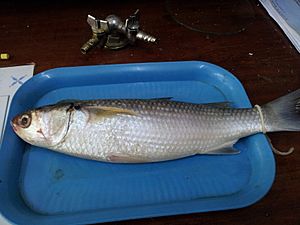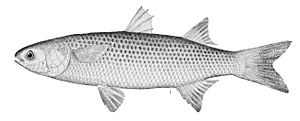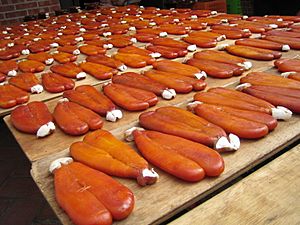Flathead grey mullet facts for kids
Quick facts for kids Flathead grey mullet |
|
|---|---|
 |
|
| Conservation status | |
| Scientific classification |
|
| Kingdom: | Animalia |
| Phylum: | Chordata |
| Class: | Actinopterygii |
| Order: | Mugiliformes |
| Family: | Mugilidae |
| Genus: | Mugil |
| Species: |
M. cephalus
|
| Binomial name | |
| Mugil cephalus Linnaeus, 1758
|
|
| Script error: The function "autoWithCaption" does not exist. | |
| Synonyms | |
|
|
Script error: No such module "Check for conflicting parameters".
The flathead grey mullet (Mugil cephalus) is an important fish that people eat. It belongs to the mullet family. You can find this fish in warm and mild coastal waters all around the world.
These fish are usually about 30 to 75 centimeters (12 to 30 inches) long. They have many different names, like striped mullet, black mullet, or just mullet.
Flathead grey mullets are active during the day. They often swim into estuaries (where rivers meet the sea) and even rivers. They usually swim in groups over sandy or muddy areas. Young mullets eat tiny water creatures called zooplankton. Adult fish mostly eat algae found in fresh water. These fish are special because they are euryhaline. This means they can live in water with different amounts of salt, from fresh to salty.
Contents
What Does It Look Like?
The flathead grey mullet has an olive-green back. Its sides are shiny silver, and its belly is white. It might have six or seven clear horizontal stripes along its body.
Its lips are thin. This fish does not have a lateral line, which is a special sensing line many fish have. A common length for this fish is about 50 centimeters (20 inches). The biggest ones can grow up to 100 centimeters (39 inches) long and weigh up to 8 kilograms (18 pounds).
Where Do Mullets Live?
Flathead mullets live in coastal waters all over the world. You can find them in warm (tropical), mild (subtropical), and cooler (temperate) areas. They live in all seas, from the Bay of Biscay in Europe to Nova Scotia in North America.
They can live in fresh, slightly salty (brackish), and salty (marine) water. They are found at depths from the surface down to 120 meters (390 feet). They prefer water temperatures between 8 and 24 degrees Celsius (46 to 75 degrees Fahrenheit).
Mullets in Australia
In Australia, flathead mullets are found almost everywhere along the coast. They live from Far North Queensland, around southern Australia, to the Kimberley region in Western Australia. You can also find them near Tasmania.
They live in warm and mild coastal waters and in estuaries. They are often seen in the lower parts of rivers too. Because they can handle different salt levels, they also live in lagoons and lakes. However, they swim back to the sea when it's time to lay their eggs.
Mullets in the Western United States
In the freshwaters of the western United States, flathead mullets used to swim far up the Colorado River. Now, because of dams and less water flowing to the Gulf of California, their range is smaller.
They are still found in parts of the Colorado River and the lower Gila River when there is enough water. Mullets often swim in small groups in larger pools. Their numbers are going down in Arizona because the Colorado River sometimes doesn't reach the Gulf of California.
Fishing and Farming Mullets
The flathead grey mullet is a very important food fish worldwide. People catch them from the wild and also raise them on fish farms. In 2012, about 130,000 tonnes of mullets were caught by fishing. Fish farms produced even more, about 142,000 tonnes.
Mullet in the Kitchen
The roe (eggs) of the mullet is a special food in many places. It is salted, dried, and pressed. This makes foods like Greek avgotaraho, Japanese karasumi, and Italian bottarga. In Egypt, the fish itself is salted, dried, and pickled to make a dish called fesikh.
Along the coast of Northwest Florida and Alabama, this mullet is a popular seafood. People often eat it fried, but also smoked, baked, or canned. Local fishermen usually catch mullets using a castnet or a large seine net from the shore. Mullet is a special treat in this area and is mostly eaten at home.
People often cut the fish into fillets. The leftover parts are used to make fish stock for soups and stews. In Florida, the white mullet (Mugil curema) is often preferred. This is because it lives in cleaner water, which gives it a less muddy taste.
Images for kids
See also
 In Spanish: Mújol para niños
In Spanish: Mújol para niños
 | James Van Der Zee |
 | Alma Thomas |
 | Ellis Wilson |
 | Margaret Taylor-Burroughs |






